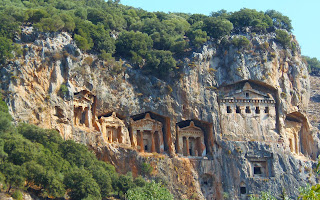I have a lot of stuff. I have things given as gifts, inherited furniture and hand-me-downs, functioning and broken appliances and gadgets, art and other equipment for hobbies and other pastimes. I don't like shopping and recycle, repair and reuse as much as I can. But I am not materialistic, and feel no particular connection to any of these belongings, regardless of whether they were gifts from close family members. I value such gifts no more than the fossils I have collected on beach walks (which does not mean I don't value them - I do.)
I don't think I am sentimental.
I often pore over those questions that are meant to make you really
consider your priorities, and give you clues as to the type of person you are. For
instance: 'If your house was on fire, and you could only save one thing, what
would that be?' You are usually allowed to omit the obvious things (family
members, pets etc.) but this has always perplexed me.
Those who would return for a pet, or a photo album, a cherished item
belonging to a late relative are deemed more human than those who would return for an expensive or useful item. Few would admit to going back for a laptop or
phone (but I understand that has changed recently where teenagers and their phones are concerned, which concerns me
deeply). When I ask myself that
question, I struggle with everything about it:
Why is my house on fire? Why didn’t
I put it out? Where are my family? I don’t
have any pets. Belongings are just
things… stuff. But then I think about my
dictionary.
When I was about 12 or 13, I would go to the library, a lot. It was an important haven from school and family where I could lose myself in other worlds. One day, there was a sale of books, and among the well-thumbed volumes were
some older books. One of the books caught my attention. It was thick, with marbled
board covers and a half leather bound spine.
The words Lampriere and the date 1859 were visible in small capitals in
gold. I picked it up and looked at the
price. I looked at the spine again
and saw that it was a ‘Classical Dictionary’.
I had no idea what this was, but I liked classical architecture and
words, so I looked inside. I thumbed the
pages and the book fell open at NI. I
read the first entry: ‘Nestorius – A Bishop of Constantinople who flourished
A.D.431. He was condemned and degraded
from his episcopal dignity for his heretical opinions.’ I was taken aback – What was this? Who was this person? What was this language? What was
episcopal? I knew where Constantinople
was, thanks to the old song, but the rest was intriguing. I read on. Nestus, or Nessus – a small river
in Thrace… (Where was Thrace? ) Netum –
a town of Sicily, now called Noto, Neuri – a people of Sarmatia (where was
Sarmatia?)… Nicaea – a widow of Alexander who married Demetrius…
I was enthralled by the names and places immediately, so I bought the book - using the last few of the tatty pound notes from my pocket money - and took it home. I followed the references to their logical
ends, pulling the threads of history and stories, places, people and events. Some of them could be tied together, or led
to more, connected threads. Stories and
histories began to emerge, piece by piece, name by name. Within a year or two I had discovered Homer
and Virgil, Socrates and Plato and more and widened my reading even more. My vocabulary had probably doubled in size and I had learned an
appreciation of Latin and Greek which helped me understand yet more
words. What a find this old dictionary
was!
It has sat on my shelf since then, sandwiched between the
complete works of Shakespeare and my Aubrey Beardsley Illustrated copy of
Thomas Mallory’s Le Morte D’Arthur, to be taken down and carefully thumbed from time to
time. It is very dilapidated now, and I
often think I might like to get it mended, but I'm not sure I could bear to entrust it to
someone else.
It struck me that this book might be the one thing I would rescue for my theoretically burning house. But it would not be sentimentality that would spur me – it is just a book. But it represents everything about me and the way I see the world - detail, by exquisite detail. The excitement of finding two snippets that have a common thread, or following enough threads to constitute a story of a battle, an adventure or a tragedy, is laid out within the pages of that book, in much the same way it is within me. To most it is a random collection of defunct facts about irrelevant places and events, but to me, (and hopefully, some others) it was a clue that led to another world; a rich tapestry of magical names and strange language that harks back to ancient times, great deeds and heroes of the intellect and the battlefield.
No,
I probably wouldn’t go back for it. It would be difficult to replace, but I
have to believe there are one of two more of them out there…

No comments:
Post a Comment